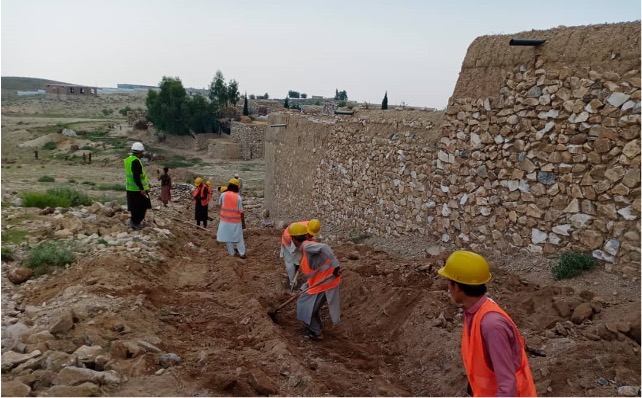Asad Khil village is located in Spinghar district of Nangrahar province in eastern Afghanistan. Because the village is located on high ground, until the middle of this year, the villagers had to descend the hill to get water. The nearest water source was a patch of open water seven kilometres from the village, a journey of some five hours by foot. To make matters worse, this water was impure, meaning that waterborne diseases were rife among the population of the village, especially during summer months.
No Life Without Water
December 15, 2022

Asad Khil village is located in Spinghar district of Nangrahar province in eastern Afghanistan. Because the village is located on high ground, until the middle of this year, the villagers had to descend the hill to get water. The nearest water source was a patch of open water seven kilometres from the village, a journey of some five hours by foot. To make matters worse, this water was impure, meaning that waterborne diseases were rife among the population of the village, especially during summer months.
Safe drinking water is one of the necessities of life, yet Afghanistan has one of the highest rates of waterborne disease in the world, with the latest findings indicating that around eight in every ten Afghan people regularly drink unsafe water. Diseases caused by unsafe water have claimed many more lives than terror attacks in recent years, with diarrhoeal diseases in Afghanistan the second most common cause of deaths of children under the age of five.
Under the ABADEI project, UNDP’s flagship development programme in Afghanistan, The Swedish Committee for Afghanistan (SCA) implemented a water supply project to Asad Khil. The goal of the project was to provide safe drinking water access, directly benefitting around 350 households in the village.
Haji Hikmatyar, a 40-year-old member of the Community Development Council CDC in Asad Khil, says, “We were in a very difficult situation as there was no access to safe drinking water in our village. Villagers were often walking miles to find fresh water, and even getting injured on the journey.”
“We would regularly complain to the government. Unfortunately, poor security in the area made it difficult to get help. After we had a coordination meeting with the ABADEI project team, it was decided to implement the pipe scheme project in our village,” says Haji. “This came as a surprise to the residents. We are really grateful that that our voice has finally been heard. Haji believes that the water pipe will make a big difference in the village. “The water pipe will not only make life much easier for the women who usually fetch the water, but the children will have access to safe drinking water.”
Access to safe drinking water in villages like Asad Khil is not only a vital to good health, but has a positive effect on livelihoods and school attendance, because of fewer sick days. It also contributes to community cohesion. In the case of Asad Khil, however, the construction of the water pipe has had other benefits too. Under ABADEI, local workers are paid as labourers on the construction projects which benefit their communities as part of a ‘cash-for-work’ scheme. The employment is temporary, but is a welcome injection of money into local economies, and also teaches valuable skills to the workers. The water supply project in Asad Khil created work for 4,100 skilled and unskilled labourers paying 700 Afg (US$8) and 400 Afg ($4.50) respectively, for an average of 55 days each.
Khan Nazeer is a 43-year-old local resident of Asad Khil. “I lost my job after the collapse of the government in August 2021. Before that I was the sole breadwinner of my family of nine children. I was desperately looking for the job, but without success. Eventually, I decided to migrate to another country just to keep my family from starving. That was when I was informed by the community leader about the water pipe project. I got a job in the cash-for-work scheme as an unskilled labourer. I have been working here for the last three months, getting around 400 Afg per day. I now have money to feed my family and meet their needs. I am also very happy that they will have access to safe drinking water at their doorstep when the pipeline is complete.”
The Asad Khil pipe network project was designed and launched on August 30th, 2022, to provide safe drinking water access to the rural residents of Assadkhil village in Spinghar district. It was implemented by The Swedish Committee For Afghanistan (SCA) working in partnership with UNDP under the ABADEI project.
ABADEI (Area-Based Approach for Development Emergency Initiatives) is UNDP’s tailored area-based integrated programming approach to support basic human needs which complements short-term humanitarian life-saving assistance by protecting livelihoods and strengthening communities. ABADEI interventions are centered around addressing worsening poverty and vulnerability, supporting community resilience and social cohesion, and enabling the rehabilitation of small-scale infrastructure vital for basic human needs, such as health and education.

 Locations
Locations



